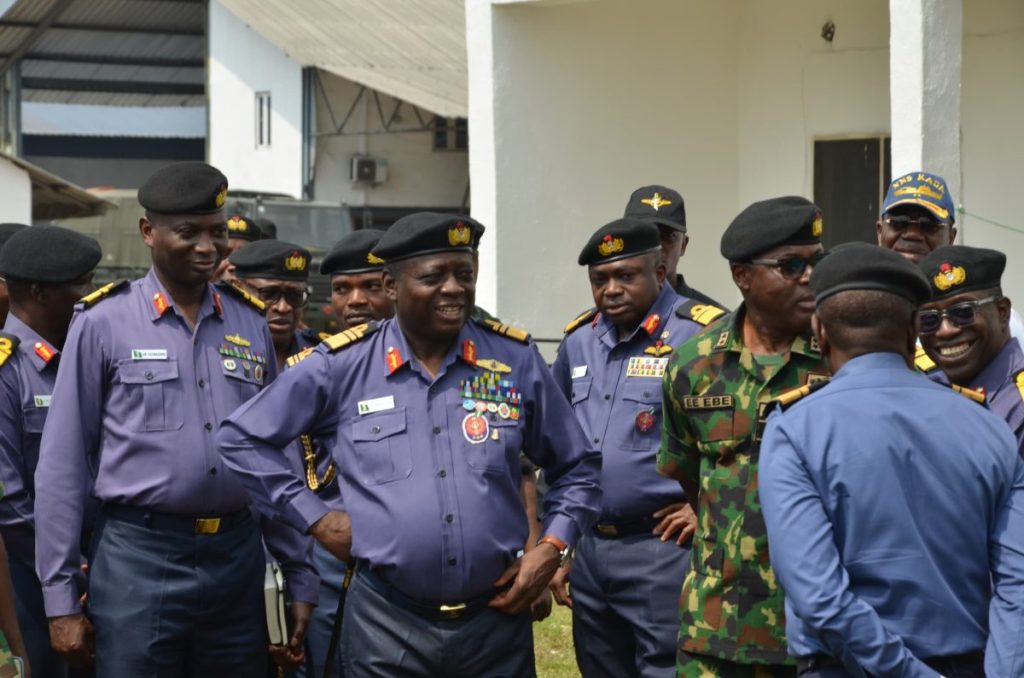
Mkpoikana Udoma
Port Harcourt — The Nigerian Navy is making significant strides in local shipbuilding and repairs, with several key projects nearing completion at the Naval Shipyard in Port Harcourt.
Speaking during a working visit to the facility on Sunday, Chief of the Naval Staff, Vice Admiral Emmanuel Ikechukwu Ogalla, expressed satisfaction with the shipyard’s activities, describing them as vital to the Navy’s operational readiness and the development of Nigeria’s maritime industry.
Ogalla said his visit to the Naval Shipyard in Port Harcourt underscores the Nigerian Navy’s commitment to leveraging local capacity to enhance operational readiness, reduce reliance on costly imports, and strengthen Nigeria’s maritime security infrastructure.
“Yes, I’m here today on a working visit to the Naval Shipyard in Port Harcourt to look at some of the projects they are engaged in, mostly ship repairs and shipbuilding. And of course, you know that there’s no Navy that can do well without effective ship repair and shipbuilding capability,” Ogalla stated.
The Chief of Naval Staff inspected several projects, including the reactivation of dilapidated naval security houseboats, the construction of a ferry for the Akwa Ibom State government, and the completion of operational boats.
“For instance, the naval security stations, which are our houseboats that were deployed for some years and have become dilapidated—so many of them have been reactivated here. The ferry we are constructing for the Akwa Ibom State government is almost 70% completed. The operational boats, 10 of them are about 90% completed,” he explained.
Ogalla also highlighted ongoing dredging efforts to expand the waterfront, allowing larger ships to berth, and the near-completion of a slipway.
“There is a lot of rehabilitation, also in terms of trying to dredge the waterfront to create more room for our ships to be able to come in here to berth. One of the problems we are facing is a lack of adequate jetty, and we are trying to dredge the waterfront to enable our ships to come in here to berth. Also, our slipway, which is under construction, is about 90% completed,” he said.
According to Ogalla, the shipyard’s work is not only improving the Navy’s fleet and operational readiness but also benefiting the broader maritime industry.
“All these are being done locally here by the shipyard, and what they are doing is not only contributing to our fleet and operational readiness, but it’s also contributing to the maritime industry in the Niger Delta and Nigeria as a whole, and even the West African subregion,” he added.
The Chief of Naval Staff emphasized the need for greater awareness of the Navy’s local shipbuilding capabilities. “Many of the industry players do not know that these capacities are here, and they go ahead to bring these same boats from abroad at very high costs, sometimes 10 times the cost of what we use to build them here. We are also encouraging the shipyard and the dockyard to go into publicity, to be able to make their work be seen by the industry so that they will now know that we can do some of these things here,” he said.
Ogalla attributed the preference for imported vessels to a lack of awareness, which he referred to as “sea blindness.”
“Actually, why many go abroad to buy some of these things that we can do here is lack of knowledge, which is as a result of what we call sea blindness. But I think we’re overcoming such a problem gradually,” he noted.
While acknowledging the limitations of the shipyard’s current capacity, Ogalla praised its progress toward meeting global standards.
“Yes, within the scope that we are operating, what we are building here meets world-class standards. We may not have the capacity to build very big ships like carriers, frigates, destroyers, but at the level of offshore patrol vessels, we’re close to meeting the world-class standard,” he said.



